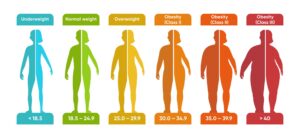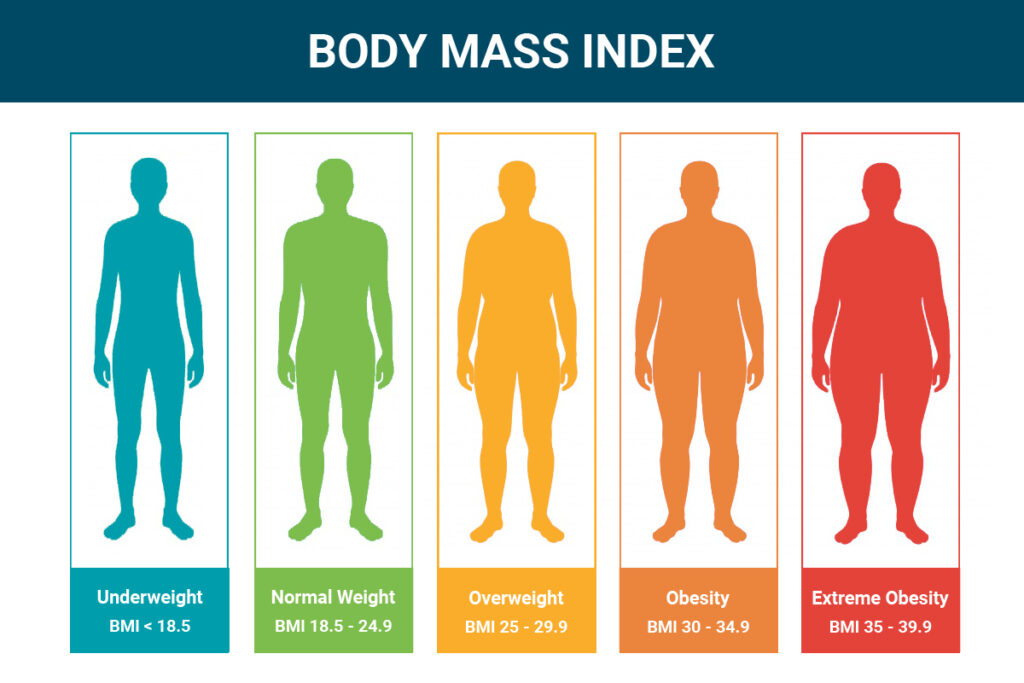Understanding your ideal Body Mass Index (BMI) plays a crucial role in the quest for optimal health. A BMI calculator can be a valuable tool for women and men looking to achieve their health goals. BMI calculators offer valuable insights into your overall health and well-being by providing a simple way to assess whether your weight is within a healthy range for your height.
Regarding maintaining a healthy weight, it’s important to remember that BMI is not the sole indicator of overall health. However, it can serve as a starting point for understanding your body composition and identifying areas for improvement. By regularly tracking your BMI, you can make informed decisions about your diet, exercise routine, and lifestyle habits to achieve a healthier weight and reduce the risk of various health conditions.
Whether you’re looking to shed a few pounds or maintain a healthy weight, a BMI calculator can be a game-changer in your journey toward optimal health. Armed with this knowledge, you can take control of your well-being and make informed choices to achieve your goals. So, let’s dive in and discover how BMI calculators can empower women and men to lead healthier lives.

Understanding Body Mass Index (BMI)
Body Mass Index (BMI) measures body fat based on weight and height. It provides a general indication of whether a person’s weight is within a healthy range relative to height. BMI is calculated by dividing a person’s weight in kilograms by the square of their height in meters. The resulting number is then classified into different categories to determine if a person is underweight, normal weight, overweight, or obese.
It’s important to note that BMI is not a direct measure of body fat percentage or overall health. Muscle mass, bone density, and fat distribution can influence a person’s BMI. However, BMI remains a widely used tool in healthcare and is a starting point for assessing weight-related health risks.
Importance of Maintaining a Healthy BMI
Maintaining a healthy BMI is crucial for overall health and well-being. Research has shown that individuals with a higher BMI are at an increased risk of developing various health conditions, including heart disease, type 2 diabetes, high blood pressure, and certain types of cancer. On the other hand, being underweight can also have negative impacts on health, leading to nutrient deficiencies, weakened immune systems, and increased risk of osteoporosis.
By striving to achieve and maintain a healthy BMI, you can reduce the risk of these health conditions and improve your overall quality of life. A healthy BMI is associated with increased energy levels, better physical fitness, improved mental well-being, and a reduced risk of chronic diseases. It’s important to remember that everyone’s body is unique, and the ideal BMI may vary depending on factors such as age, sex, and muscle mass.
How BMI Calculators Work
BMI calculators are simple online tools that allow you to calculate your Body Mass Index quickly. These calculators require you to input your height and weight, and they will generate your BMI based on the information provided. The calculations are usually done using the metric system, so it’s important to have your weight in kilograms and height in meters for accurate results.
BMI calculators work by applying a mathematical formula to determine your BMI category. The formula divides your weight in kilograms by the square of your height in meters. The resulting number is then classified into different categories, such as underweight, normal weight, overweight, or obese, based on predetermined ranges.
Calculating Your BMI
To calculate your BMI, you need to know your kilograms, weight, and height in meters. If you use the imperial system, you can convert your weight in pounds to kilograms by dividing it by 2.2046 and your height in inches to meters by multiplying it by 0.0254.
Once you have your weight and height in the appropriate units, you can use the BMI formula to calculate your BMI. The formula is as follows:
BMI = weight (kg) / (height (m))^2
For example, if your weight is 70 kilograms and your height is 1.75 meters, the calculation would be:
BMI = 70 / (1.75)^2 = 22.86
Once you have calculated your BMI, you can use the BMI categories to interpret the results and determine whether your weight is within a healthy range for your height.
Interpreting Your BMI Results
After calculating your BMI, it’s important to understand the different BMI categories and what they mean for your health. The World Health Organization (WHO) provides the following classification for adults:
- Underweight: BMI less than 18.5
- Normal weight: BMI between 18.5 and 24.9
- Overweight: BMI between 25 and 29.9
- Obesity: BMI of 30 or higher
It’s important to note that these categories are general guidelines and may not apply to everyone. Muscle mass, bone density, and age can influence the interpretation of BMI results. For example, athletes and individuals with higher muscle mass may have a higher BMI due to muscle weight, even though they have a low body fat percentage.
Suppose you fall into the underweight, overweight, or obese categories. In that case, it’s advisable to consult with a healthcare professional to assess your overall health and develop a personalized plan to achieve a healthier weight.
Ideal BMI Ranges for Women
The ideal BMI range for women may vary depending on age, body composition, and overall health. Generally, a BMI between 18.5 and 24.9 is considered within the normal weight range. However, it’s important to consider other factors, such as muscle mass and body fat percentage, to determine the optimal BMI for an individual.
Pregnant or breastfeeding women may have different BMI recommendations as the body changes significantly during these periods. It’s always best to consult a healthcare professional for personalized advice based on individual circumstances.
Ideal BMI Ranges for Men
Like women, the ideal BMI range for men is generally between 18.5 and 24.9 for normal weight. However, individual factors such as muscle mass, body composition, and overall health should be considered for a more accurate assessment.
Men actively engaged in strength training or have a higher muscle mass may have a higher BMI due to increased weight from muscle. In such cases, it’s important to consider other measures of body composition, such as body fat percentage, to assess overall health.
Factors That Can Affect BMI
While BMI is a useful tool for assessing weight-related health risks, it’s important to consider that it may not provide a complete picture of an individual’s overall health. Muscle mass, bone density, age, and ethnicity can influence BMI results.
Muscle mass: Individuals with higher muscle mass may have a higher BMI due to increased weight from muscle. This can lead to an overestimation of body fat percentage in some cases.
Bone density: People with higher bone density may have a higher BMI due to increased weight from bones. This does not necessarily indicate a higher body fat percentage.
Age: BMI may need to be interpreted differently for older individuals, as muscle mass tends to decrease. Even with a normal BMI, older adults may have a higher body fat percentage.
Ethnicity: Different ethnic groups may have different body compositions, influencing BMI interpretation. For example, individuals of Asian descent may have a higher body fat percentage at a lower BMI compared to other ethnicities.
Tips for Achieving and Maintaining a Healthy BMI
Achieving and maintaining a healthy BMI requires a holistic approach to health and well-being. Here are some tips to help you on your journey:
- Balanced diet: Maintain a balanced diet that includes a variety of fruits, vegetables, whole grains, lean proteins, and healthy fats. Avoid excessive consumption of processed foods, sugary beverages, and high-fat foods.
- Regular exercise: Engage in regular physical activity, including cardiovascular exercises, strength training, and flexibility exercises. Aim for at least 150 minutes of moderate-intensity aerobic activity or 75 minutes of vigorous-intensity aerobic activity per week.
- Portion control: Be mindful of portion sizes and avoid overeating. Use smaller plates and bowls to help control portion sizes, and listen to your body’s hunger and fullness cues.
- Hydration: Drink plenty of water throughout the day to stay hydrated. Avoid sugary drinks and excessive alcohol consumption.
- Sleep: Prioritize quality sleep and aim for 7-9 hours per night. Lack of sleep can disrupt hormonal balance and contribute to weight gain.
- Stress management: Find healthy ways to manage stress, such as meditation, yoga, deep breathing exercises, or engaging in hobbies and activities that bring you joy.
- Regular check-ups: Schedule regular check-ups with your healthcare provider to assess your overall health and monitor any changes in your BMI or other health markers.
Remember, achieving and maintaining a healthy BMI is a lifelong journey. It’s important to focus on sustainable lifestyle changes rather than quick fixes or fad diets. Listen to your body, prioritize your well-being, and seek support from healthcare professionals or registered dietitians if needed.
Conclusion and the Role of BMI Calculators in Promoting Optimal Health
In conclusion, understanding your ideal Body Mass Index (BMI) is an important step towards achieving optimal health. While BMI is not the sole indicator of overall health, it can provide valuable insights into your body composition and help identify areas for improvement.
BMI calculators offer a convenient and accessible way to calculate your BMI and track your progress over time. By regularly monitoring your BMI and making informed decisions about your diet, exercise routine, and lifestyle habits, you can work towards achieving and maintaining a healthy weight.
However, it’s important to remember that BMI is just one tool in a comprehensive approach to health and well-being. Muscle mass, bone density, and age should be considered when interpreting BMI results.
Ultimately, the goal should focus on overall health rather than solely achieving a specific BMI. Adopting a balanced approach that includes a nutritious diet, regular exercise, stress management, and regular check-ups with healthcare professionals can promote optimal health and well-being for a lifetime.







